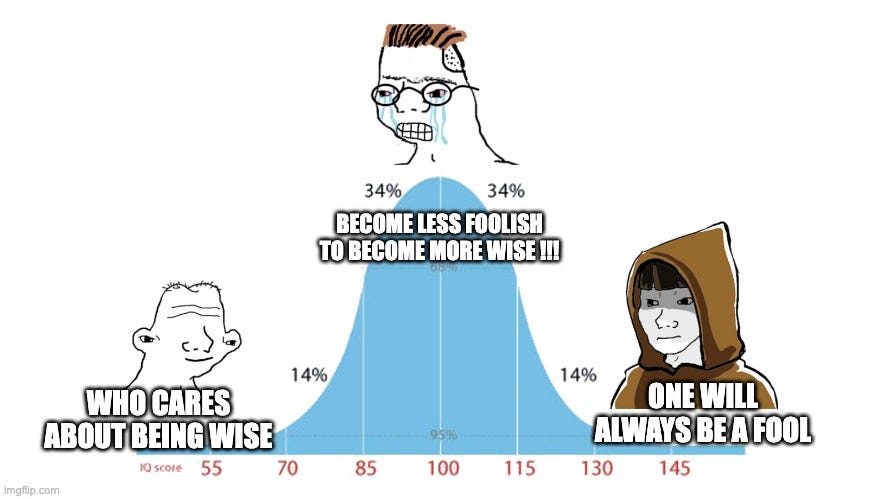It’s fun to see a meme meet its logical conclusion:

For those unaware, the midwit meme, as depicted by the IQ bell curve, signifies the horseshoe theory at play with a myriad of opinions. Individuals at both extremes of the bell curve share similar views, albeit with differing rationales. Meanwhile, those in the middle, the "midwits," hold opinions they overestimate, overpraising their intelligence in the process.
Here are some examples of midwit memes summarizing previous Less Foolish entries:
While the meme uses intelligence as measured through IQ tests to illustrate midwittery, measured intelligence is not the essence of the meme. Analyzing the meme based on opinion types is also a mistake. There are no inherently midwit opinions. Rather, the meme's essence can be described as follows: someone who has borrowed opinions while presenting themselves as intelligent for having them.
As the opening meme of this entry portrayed, those who use the midwit meme are themselves midwits. I had this sense last summer when I saw the midwit meme being overused by the edgy bad boys on X, signaling they are not midwits, and are on the right end of the bell curve. This signalling attempts to create the impression that they have the courage to trust their deep intuition, which happens to be backed by impressive first-principled thinking, without them having to do any actual trusting or thinking.
These meta-midwits have something in common with the garden variety midwit: a lack of intellectual humility accompanied by an undeserved intellectual arrogance. The intellectual signaling from midwits is a form of "narcissistic supply," the source of what gives them the "special feeling"1 they are greedily attached to.
The truth is, in terms of borrowed opinions, we all are midwits. It takes a lifetime of philosophizing to examine all aspects of one's worldview, and borrowed opinions can have practical utility. However, deriving a special-feeling from one's intelligence is a separate issue. The feeling is optional and can impede intellectual humility if not relinquished. In the book Intellectual Humility: An Introduction to the Philosophy and Science, intellectual humility is understood as the virtuous mean between intellectual arrogance and intellectual diffidence.
One who is intellectually humble has an accurate assessment of their intellectual views and capacities. This assessment is difficult, especially with the former, demanding humility in one’s assessment. There are a few strategies to cultivate intellectual humility; one way is to have a clearer sense of what intelligence actually is. Often, I see people jumble up the following qualities together:
High general intelligence, aka, can manipulate information quickly.
High verbal intelligence, aka, can talk impressively, also known as a being a "wordcel."
Practically knowledgeable.
Intellectually knowledgeable, broadly represented by "intellectuals" or narrowly represented by "subject-matter experts."
Having accurate truth claims.
Having truth claims derived from first-principled thinking.
Being rational.
Being reasonable.
Being wise (or at least acknowledging one is a fool and is becoming less foolish).
All of these are different things and should not be treated as synonymous. A common fallacy is the belief that an individual will possess all of the above qualities, especially the last one, if they possess the first two. Or, more accurately said, if they can signal they possess the first two through status-markers such as University degrees or the ability to be a wordcel at dinner parties.
The intellectually arrogant overvalue the importance of the intelligence they possess, and the intellectually diffident overvalue the importance of the intelligence others possess. Both result in foolish outcomes. An adjacent concept to the midwit is Nassim Taleb's term "Intellectual Yet Idiot" (IYI). This person has climbed academic hierarchies, developing and adopting various TOEs2, giving them a sense of entitlement to tell others how to live.
“The IYI pathologizes others for doing things he doesn’t understand without ever realizing it is his understanding that may be limited. He thinks people should act according to their best interests and he knows their interests, particularly if they are “red necks” or English non-crisp-vowel class who voted for Brexit.” - Nassim Taleb, Skin in the Game
Similar to the midwit, the IYI's arrogance contributes to collective foolishness. I would argue that intellectual arrogance invariably results in foolishness. If someone misjudges the significance of their intelligence, overestimating its utility, then the wisdom to navigate life's complexities will be hindered. Things other than intelligence are required for wise navigation.
The best way to dissuade intellectual arrogance found in midwits and IYI alike is to target the source: the narcissistic supply. Once the special-feeling dissipates or is put in its proper place, the overvaluing will also dissipate, and one can put their intelligence to proper use. This correction is the spiritual purpose of the midwit meme. Memes serve as a decentralized "leveling mechanism," the term cultural anthropologists use to describe social practices that keep egos in check.
If one encounters a midwit meme where the midwit expresses an opinion one has, they should proceed with care if emotional triggering occurs. The wrong move is to reactively double down on one's opinion or take the woke position that the meme genre itself is "problematic.” Nor is it the right move to react by releasing the opinion, unthinkingly adopting the opinion expressed on the ends of the bell curve.
Instead, when experiencing an emotional trigger upon encountering a midwit meme, one should pause, explore any attachments to their opinion, and release any lingering special-feelings. Then, and only then, can one observe how their opinion will naturally transform.
Here, I’ll give it a try…
For other perspectives on the midwit meme, here are some posts from fellow Substackers:
“The Midwit Trap” from
“How To Make a Midwit Meme” from
If you’d like to personally inquire with me, you can schedule a call here and read more about my practice here. To join Collective Journalling and other experiences, become a Less Foolish member. You can also show support for my work by subscribing, sharing, or leaving a comment.
For further musings on the “special-feeling,” read the “Your Writing is Not Special: A Guide on How Not to Become a Narcissist” entry.
TOE = Theory of Everything. See the “Minimum Viable Philosophy > Theory of Everything” entry to read more about the snares of having a big TOE get in your way.








